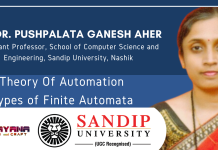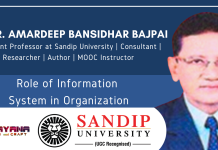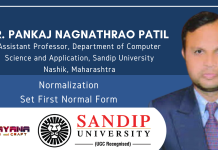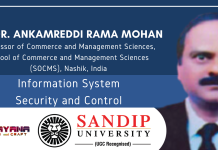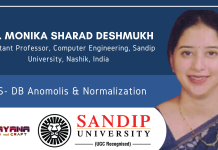
Instructor Profile:
Associate Professor and Head of Department, Dean Consultancy (Electrical), Sandip University, Nashik
Dr. Mangesh Dindayal Nikose is a distinguished academic leader and researcher, serving as the Associate Professor and Head of the Electrical and Electronics Engineering (EEE) Department at Sandip University, Nashik, Maharashtra. Additionally, Dr. Nikose holds key roles as the Dean of Consultancy (Electrical), Chairman of the Board of Studies (BOS), and Chairman of the Doctoral Research Committee (DRC). He is also an active member of the Association for Computing Machinery (ACM).
With a Ph.D. in Electronics Engineering from Nagpur University and an M-Tech in Electronics and Telecommunication from Mumbai University, Dr. Nikose brings over 14 years of extensive experience in teaching and research. He has made significant contributions to the field of Electronics and Communication, publishing numerous research articles, book chapters, and patents. His commitment to advancing academic research is reflected in his role as a PhD supervisor, having successfully guided two research scholars to completion and currently supervising six more.
Dr. Nikose’s professional affiliations include memberships in the Institution of Electronics and Telecommunication Engineers (IETE) and the Institute for Engineering Research and Publication (IFERP). His leadership and technical expertise have been showcased through his role as Convener for Faculty Development Programs (FDPs), National-Level Technical Events, and International Conferences.
In addition to his academic achievements, Dr. Nikose has provided consultancy services to several companies, including Carrot Technology Mumbai and WASAN E Mobility Pvt Ltd, Nashik. He has led innovative projects such as the development of a smart shoe for visually impaired individuals in collaboration with Neelay Industries Pvt Ltd, Nashik, and the creation of an Alexa-enabled robot named SUNBOT for Sandip University.
Dr. Nikose’s expertise extends beyond the classroom, as he has served as a Technical Reviewer for International Conferences and a Primary Evaluator for the Toycathon-2021 organized by the Ministry of Micro, Small, and Medium Enterprises (MSME). He was also a Judge at the Aavishkar Research Convention 2024.
As a thought leader in education, Dr. Nikose has shared insights on global educational trends through his published blogs, particularly addressing the impact of the COVID-19 pandemic on educational institutions worldwide.
Dr. Nikose’s passion for innovation, research, and education makes him an invaluable asset to the academic community and a leading voice in the future of Electronics and Communication Engineering.
Course Name: Wireless Network
Module 1: Fundamentals of Wireless Communication
- Introduction to Wireless Networks, Basic Concepts of Wireless Communication, Radio Frequency (RF) Spectrum and Signal Propagation, Wireless Transmission Techniques: Modulation, Coding, and Multiple Access, Cellular Networks: GSM, CDMA, LTE, Wireless Communication Standards: IEEE 802.11 (Wi-Fi), Bluetooth, Zigbee
Module 2: Wireless Network Architectures and Protocols
- Overview of Wireless Network Architectures, Ad-Hoc and Infrastructure-Based Networks, Wireless LANs (WLANs) and Wireless Personal Area Networks (WPANs), Medium Access Control (MAC) in Wireless Networks, Network Layer Protocols for Wireless Networks, Routing in Mobile Ad-Hoc Networks (MANETs) and Wireless Sensor Networks (WSNs)
Module 3: Performance, Security, and Challenges in Wireless Networks
- Wireless Network Performance Metrics and Quality of Service (QoS), Interference, Fading, and Multipath Propagation in Wireless Communication, Mobility Management and Handoff Strategies, Power Management in Wireless Networks, Security Threats and Protocols: WEP, WPA, WPA2, Wireless Intrusion Detection and Prevention Systems
Module 4: Emerging Technologies and Applications in Wireless Networks
- 5G Networks and Beyond: Features and Capabilities, Internet of Things (IoT) and Wireless Sensor Networks (WSNs), Cognitive Radio Networks (CRNs), Wireless Mesh Networks and Vehicular Ad-Hoc Networks (VANETs), Wireless Communication in Smart Cities and Industry 4.0, Future Trends and Research Directions in Wireless Networking
This structured outline provides a comprehensive view of the subject, covering key concepts, architectures, and emerging trends to equip learners with the essential knowledge and skills in the field of wireless networks.



